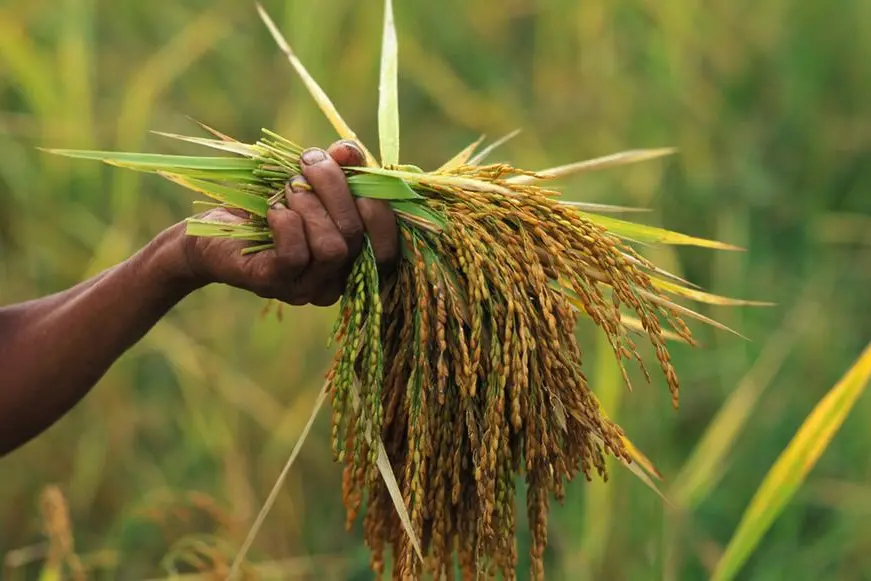PHOTO
The Philippines signed on Tuesday a five-year deal with Vietnam to ensure steady supply of affordable rice to the country as global prices of the staple continue to surge.
President Marcos, who was here for a two-day state visit, witnessed the exchange of notes between Agriculture Secretary Francisco Tiu Laurel Jr. and Agriculture Minister Le Minh Hoan at the Presidential Palace.
Under the memorandum of understanding (MOU) on Rice Trade Cooperation, Vietnam agreed to supply, through its private sector, white rice to the Philippine private sector, amounting to 1.5 million to two million metric tons per year at 'a competitive and affordable price.'
The MOU creates a framework for rice cooperation between the Philippines and Vietnam 'to ensure and establish sustainable food supply amidst the impact of climate change, pandemics and other events external to both countries.'
Laurel earlier said rice prices continue to go up globally, citing the El Niño phenomenon as among the reasons for the price surge.
The rice agreement was one of the five deals sealed during Marcos' visit here.
Vietnam supplies around 90 percent of the Philippines' rice imports. Reports said the Philippines imported 2.4 million tons of rice worth $1.5 billion from Vietnam in the first nine months of 2023.
Recent monitoring by the Department of Agriculture showed that the retail price of local regular milled rice has increased to P53 per kilo; local well-milled rice, P55; local premium rice, P60; local special rice, P68; imported well-milled rice, P56; imported premium rice, P62 and imported special rice, P65.
However, retail prices of rice in Bicol have reached P75 per kilo, according to watchdog group Bantay Bigas.
According to Bantay Bigas spokesperson Cathy Estavillo, the increase in rice prices continues despite a report by the Philippine Statistics Authority that palay production in 2023 increased to 20.05 million metric tons compared to 19.75 million MT in 2022.
Electric vehicles
Vingroup - Vietnam's largest conglomerate - is eyeing the launch of its electric vehicles (EVs) in the Philippines by April this year, President Marcos announced in Hanoi on Monday night.
'Just a while ago, we had a meeting with Vingroup…because they want to enter the Philippines…they are interested - they are the ones who make batteries and that is the most important technology today, and also to bring EVs or electric vehicles,' the President told Filipinos based here during a gathering at the Melia Hotel on Monday night.
Shortly after his arrival here on Monday afternoon, Marcos met with the executives of VinFast - a member of Vingroup - that owns a state-of-the-art automotive manufacturing complex in Hai Phong, Vietnam.
Vingroup's Philippine venture is timely, Marcos said, as the Philippines is currently in the middle of a modernization program for its public utility vehicles (PUVs), particularly jeepneys and tricycles.
'We are in the middle of our modernization program essentially meaning we are going to replace all our conveyances, buses and we have (a) particular type of transport …jeepneys,' the President said.
He told Vingroup executives, led by the company's chairman Pham Nhat Vuong and vice chairman and chief executive officer Nguyen Viet Quang, that right now, the specification for those vehicles is being finalized and the government is consolidating the operators and drivers into cooperatives.
With regard to electric vehicles and its components, Marcos said the Philippine government is proposing to leave that market open and not just focus on one supplier to complete the modernization as quickly as possible.
The Philippines could support battery production for EVs because it has all the elements that are presently necessary for electric battery production, saying the country has good reserves of nickel, cobalt and copper, he said.
According to the Presidential Communications Office (PCO), VinFast plans to sell and launch its EVs in the Philippines through dealership business by April.
In January last year, Marcos issued Executive Order 12, which temporarily reduces the tariff rates on certain EVs and their parts and components to zero percent for five years. The EO temporarily cuts the Most-Favored Nation tariff rates to zero percent on completely built up units of certain electric vehicles, except for hybrid-type EVs.
Marcos is pushing for the use of electric vehicles as a means of personal or public transport. In a speech in October last year, the President said the government aims to increase the share of EVs by up to 50 percent by 2040.
Copyright © 2022 PhilSTAR Daily, Inc Provided by SyndiGate Media Inc. (Syndigate.info).





















